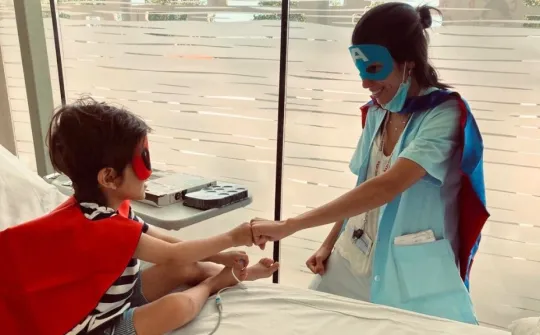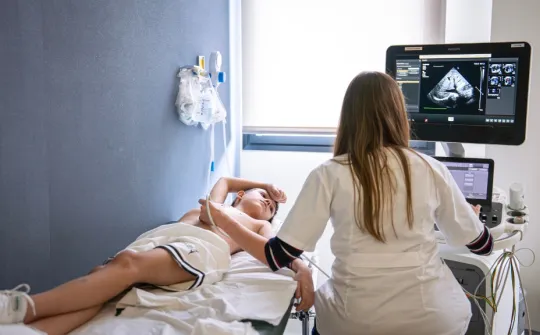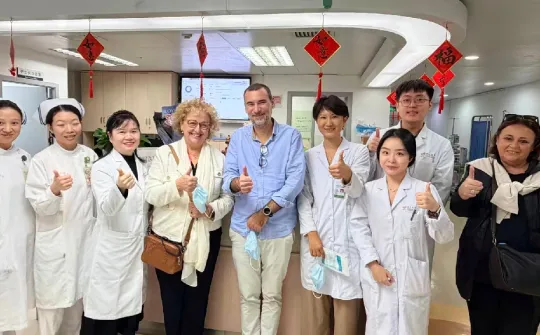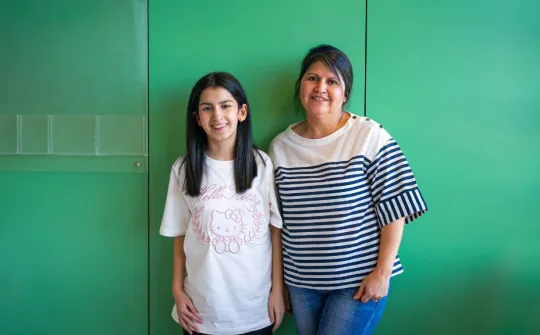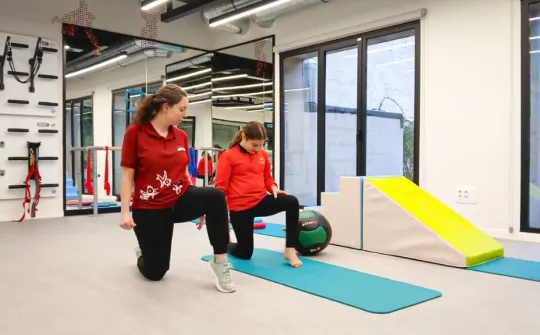Medical professionals from Mexico come to the SJD Barcelona Children's Hospital to learn about immunotherapy applications for treating very aggressive pediatric cancer
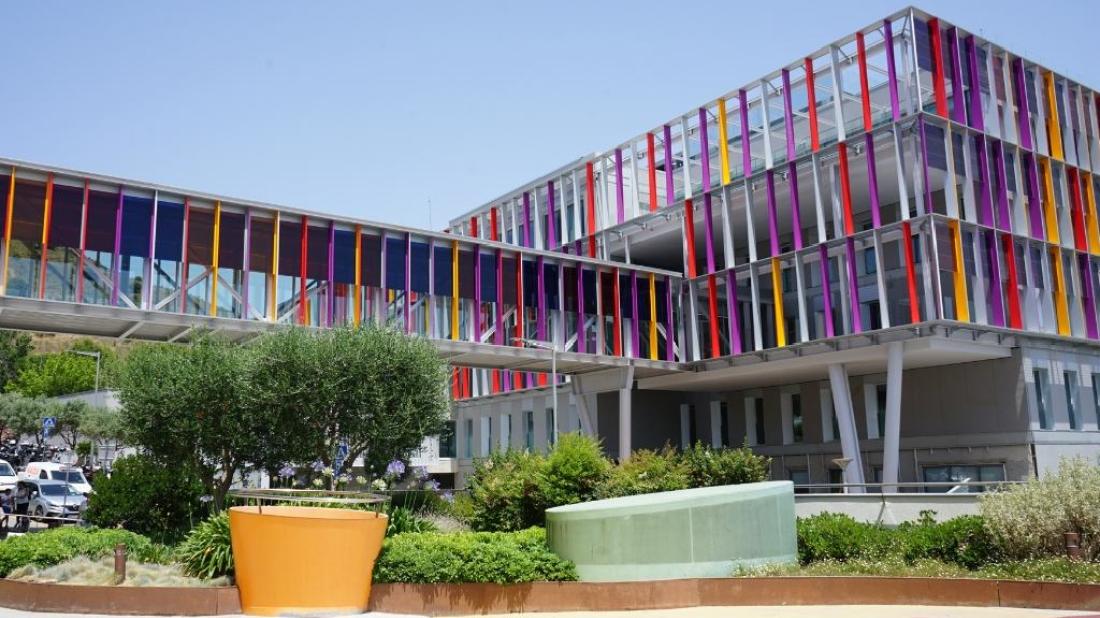
Researchers at the SJD Barcelona Children's Hospital have developed a system that can generate a prognosis for this type of cancer from as soon as a patient is diagnosed, and that can also adjust and personalise their treatment plans.
In the last two years, a dozen medical and nursing professionals working in the field of pediatric oncology in several Mexican hospitals—such as the Hospital Infantil Teletón de Oncología (HITO) or the Hospital Federico Gómez—have come to the SJD Barcelona Children's Hospital to learn about managing and treating neuroblastoma in children. This childhood cancer is the most frequently occurring cancer for children in their first five years of life, with an incidence rate of one case in every 7,000 babies born.
This pediatric cancer has a unique prognosis: on the one hand, it could spontaneously disappear and not require treatment, or, on the other, it could become extremely aggressive and require our full therapeutic arsenal. That is why, a few years ago, the SJD Barcelona Children's Hospital developed a system that could predict how a tumour would progress from as early as the first diagnosis, allowing staff to choose the most appropriate treatment.
Curing children with a high-risk neuroblastoma is a significant challenge for pediatric oncology medical staff. The SJD Barcelona Children's Hospital, alongside the Memorial Sloan Kettering Cancer Center in New York, developed a new anti-G2 immunotherapy (Naxitamab) for use in high-risk neuroblastoma cases. It was approved by the FDA(U.S. Food and Drug Administration) in November 2020.
Nowadays, the SJD Barcelona Children's Hospital is one of the most experienced hospitals in the world in the management and application of this treatment, with over 320 patients treated since 2017 and 70% of them being international patients. That is why, over the last five years, oncologists from all over Mexico have referred a total of 30 patients to the SJD: more than half of which for cancer, and, in particular, four with a high-risk neuroblastoma.
In 2022, when this treatment was first commercialised and could be offered in Mexico, medical professionals in the country began to search for and attend online training sessions with SJD staff members on how to administer immunotherapy at their centres. So far, we have helped educate medical professionals from the Hospital Infantil Teletón de Oncología (HITO), Issste Tláhuac and from the Hospital materno infantil ISSEMYM Edo, among others. Professionals who attend in-house training in Barcelona are able to combine theory with practice by attending patient infusion sessions.
Training programme for pediatric oncologists in Latin America
These sessions are carried out within the framework of a broader training programme that the SJD Barcelona Children's Hospital put forward in 2019, culminating two years later in the launch of TeLeo: a virtual platform for medical professionals working in pediatric oncology and radiotherapy, where they can find educational resources and content online in both Spanish and Portuguese.
TeLeo is praised by scientific communities and bodies, such as the International Society of Pediatric Oncology (SIOP) or the Sociedad Latino Americana de Oncología Pediátrica [Latin American Society of Pediatric Oncology] (SLAOP), and has also received funding from the Foundation S in Paris. As well as promoting education, TeLeo facilitates interaction between healthcare professionals across all participating countries, encouraging them to share clinical problems and dilemmas that can come up in daily practice. The aim is to provide better care and a more appropriate treatment to patients. Currently there are 16 Mexican healthcare professionals (from hospitals such as the HITO, IMMS UMAE CMNO, the Hospital Universitario Dr José E. González and the Hospital Civil de Guadalajara) who are taking part in the TeLeo programme.
At the same time, the SJD is leading a European project that seeks to reduce differences in survival rates between children with leukemia in Europe (80-95%) and Latin America (50-80%). These huge discrepancies are the result of an array of factors that go beyond biology, such as difficulties accessing healthcare, lack of resources for diagnosis, or poor treatment adherence. That is why the project—called CLOSER—wants to take a closer look at such causes and offer recommendations and advice to help combat these issues, thereby improving diagnoses and prognoses of patients with childhood leukemia in Latin America. There are five participating centres: three in Argentina; one in Uruguay; and one in Chile.
Global reference centre for the treatment of childhood cancer
The SJD Barcelona Children's Hospital has an over 150-year history of treating mothers, children and teenagers. It is also a leading reference centre worldwide in the treatment of countless pediatric diseases, among which, is pediatric cancer. Each year, the hospital welcomes more than 150 patients from all over the world affected by childhood cancer.
To offer the best care possible to these children, the hospital runs a monographic facility dedicated to pediatric cancer, the SJD Pediatric Cancer Center Barcelona, which offers comprehensive treatment in single facility, bringing together all of the departments and services that children and teenagers with cancer may need. Plus, all of the staff working there are dedicated to childhood cancer research. The centre treats all kinds of childhood cancers, and offers internationally tried and tested treatments in a personalised manner, adapted to each individual case (this is known as precision medicine).
The centre has been a pioneer in the development and introduction of various treatments for childhood cancer. In particular, it was one of the first hospitals in Europe to use intraarterial and intravitreal chemotherapy to prevent eye loss in cases of retinal tumour, or retinoblastoma. It also developed an oncolytic virus to prevent more aggressive retinoblastomas.
In addition, it has access to an exclusive pediatric tumour bank containing thousands of tumour samples, giving the centre huge research capabilities. Furthermore, the pediatric clinical trials unit promotes cancer research through a translational research model, which aims to bring the results of investigation projects into clinical practice as soon as possible.
